Unit 3 Travel journal Using language 课件(39张PPT)
文档属性
| 名称 | Unit 3 Travel journal Using language 课件(39张PPT) |

|
|
| 格式 | zip | ||
| 文件大小 | 2.4MB | ||
| 资源类型 | 教案 | ||
| 版本资源 | 人教版(新课程标准) | ||
| 科目 | 英语 | ||
| 更新时间 | 2019-12-15 09:09:51 | ||
图片预览

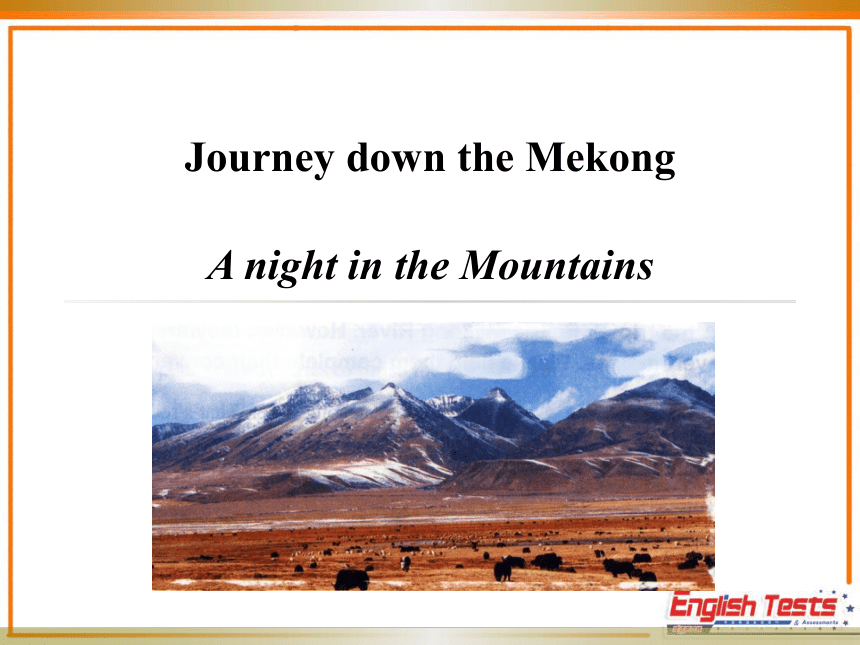
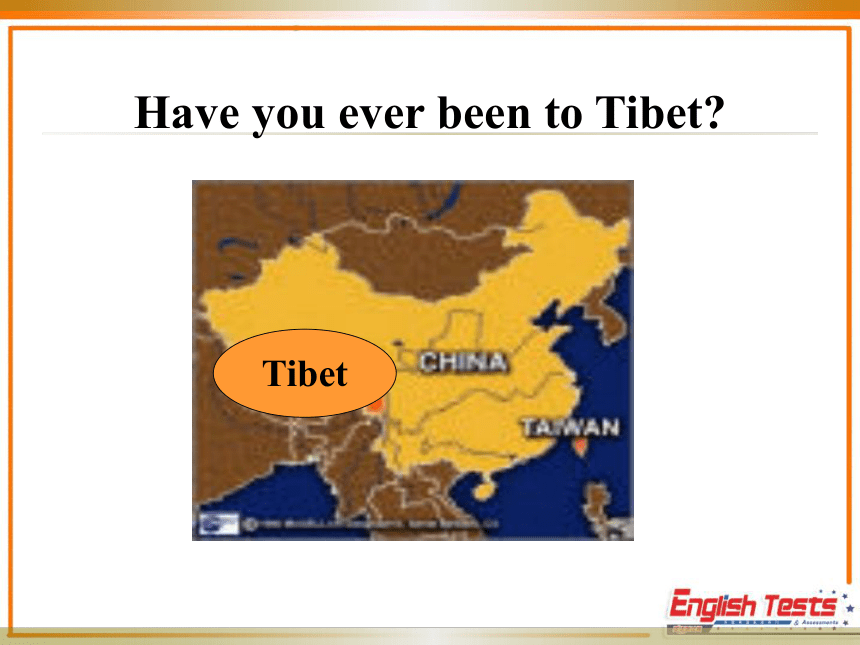
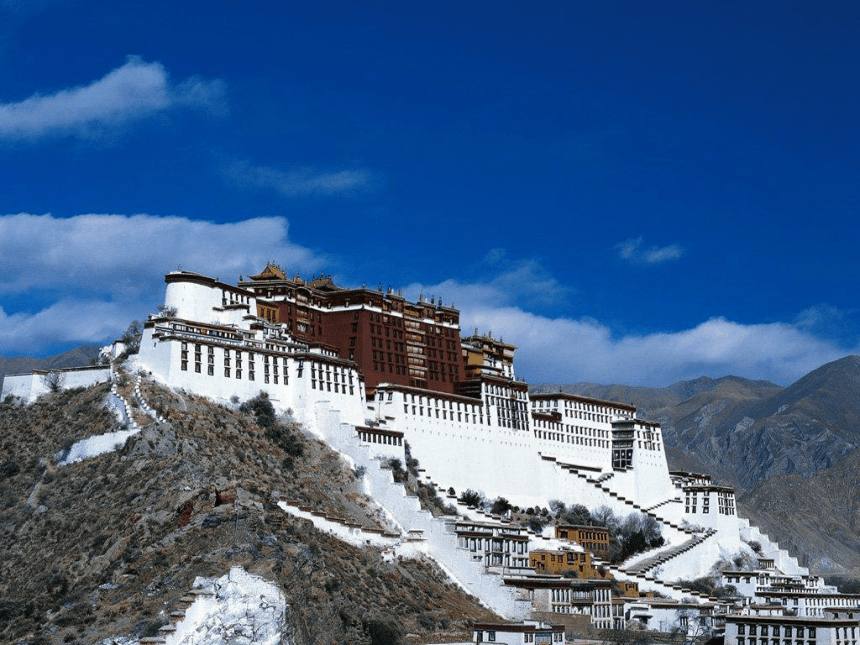
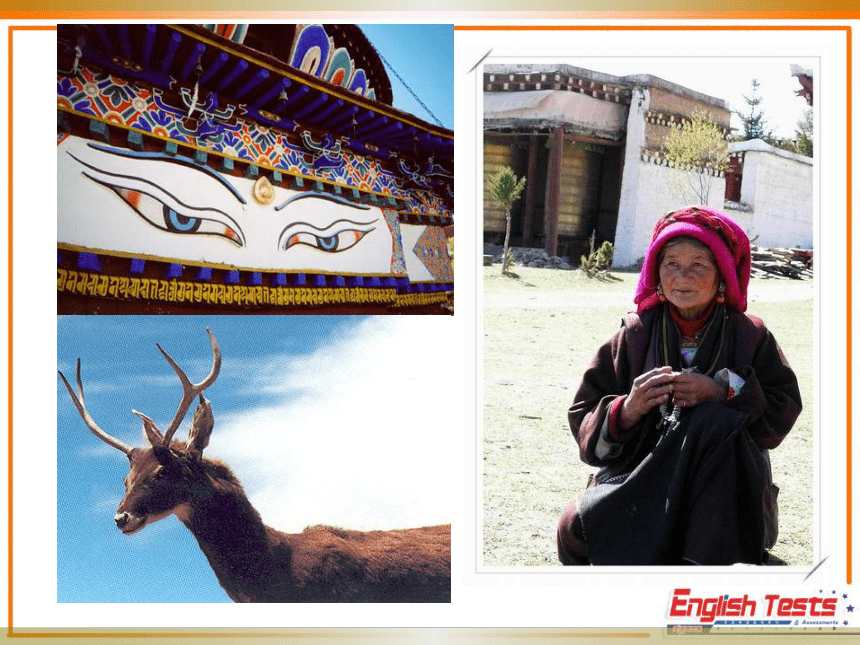
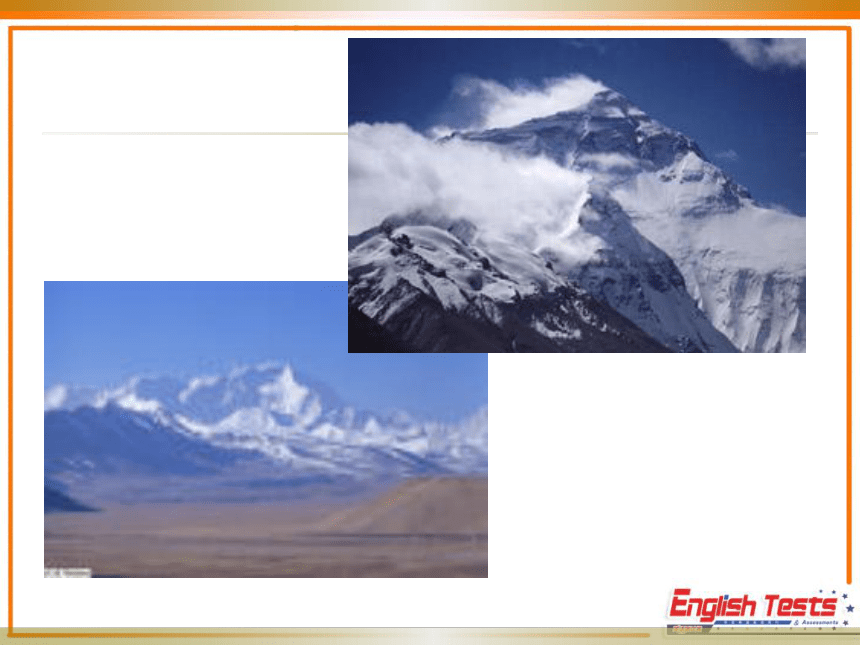
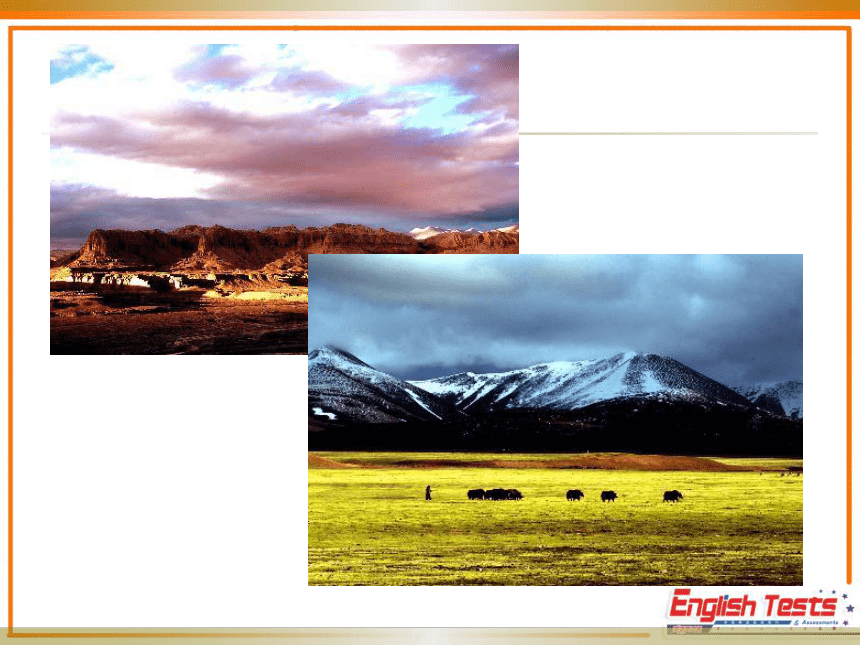

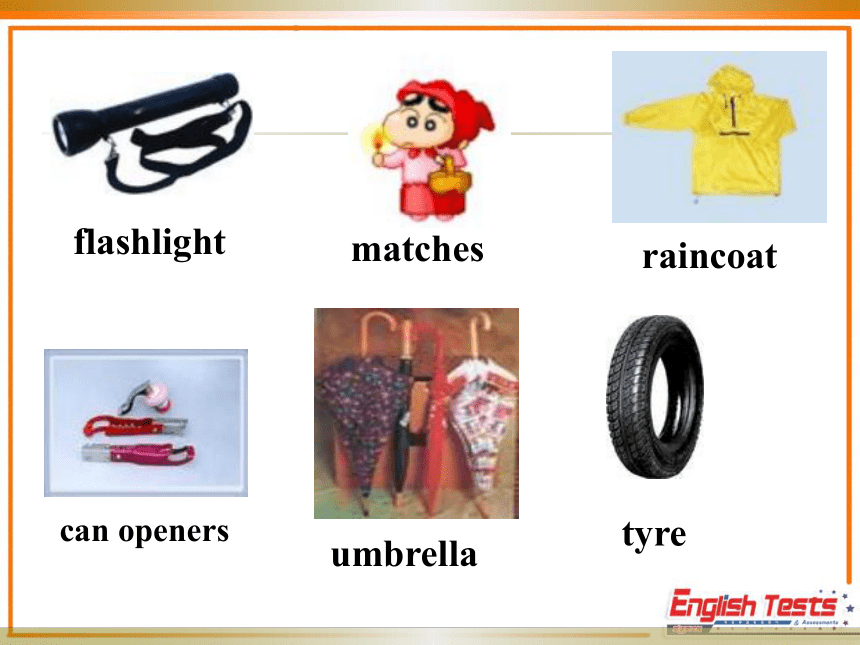
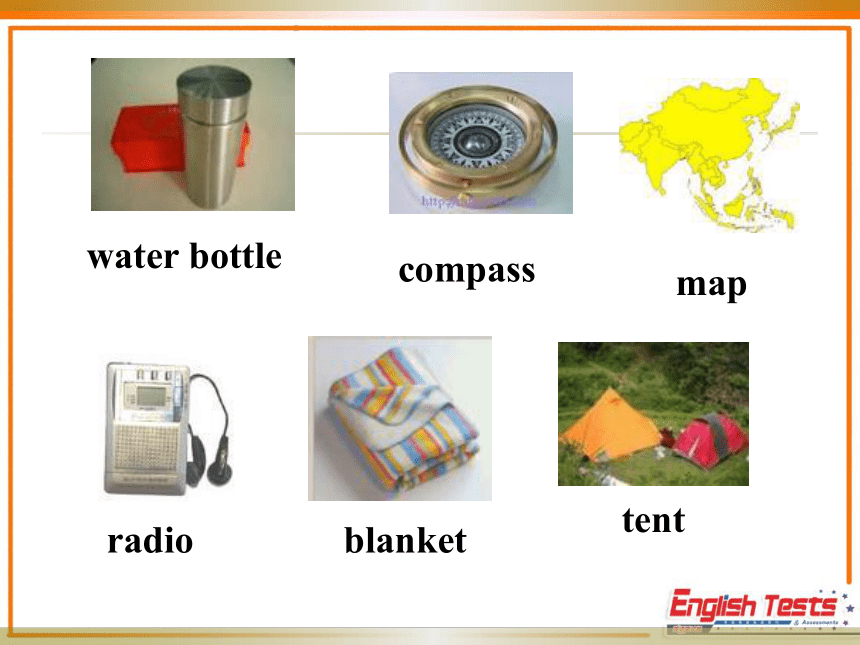
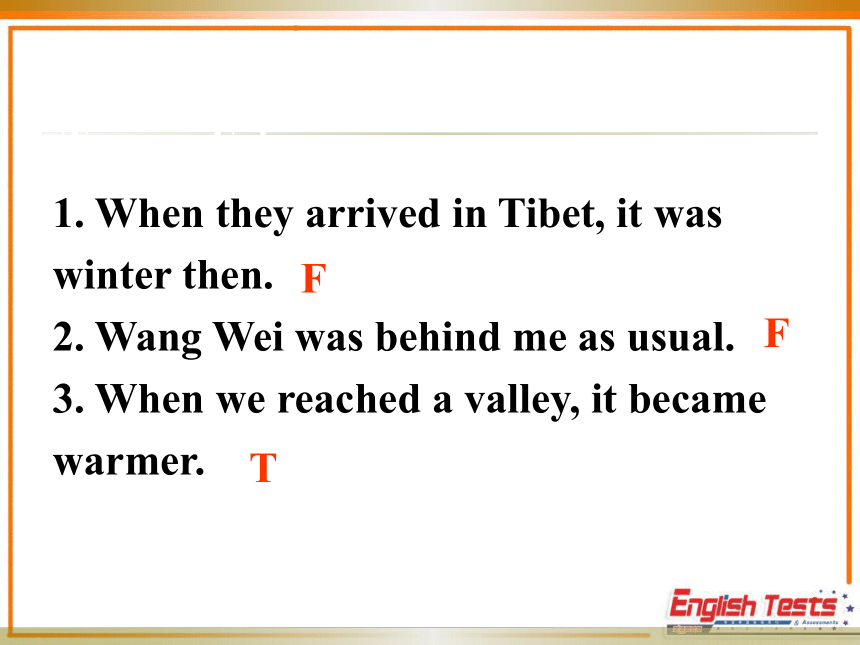
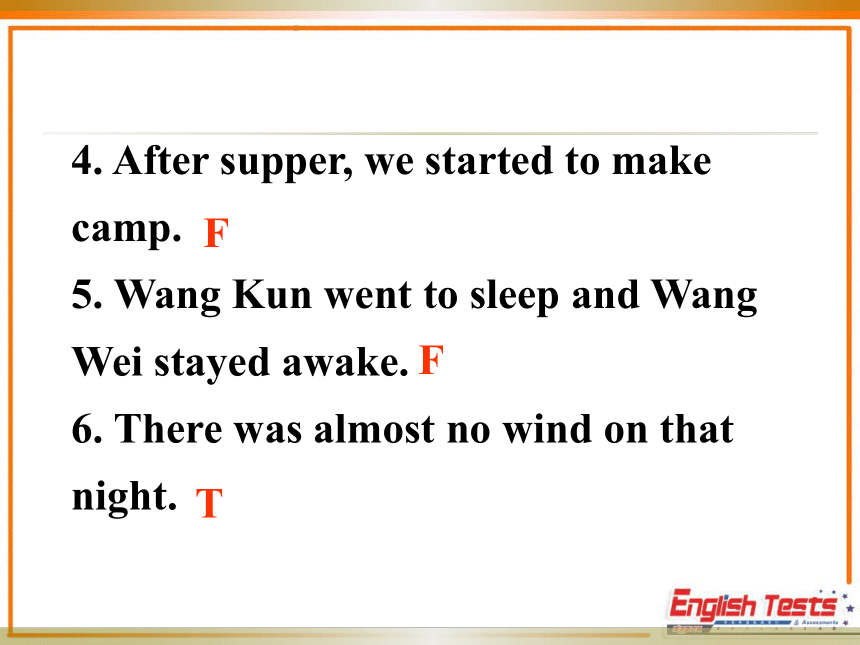
文档简介
(共45张PPT)
Unit 3
Travel journal
Using language
高一人教新课标版必修一
Journey down the Mekong
A night in the Mountains
Reading and discussing
Have you ever been to Tibet?
Tibet
Speaking activity:
Imagine that you and your partners are planning to make a trip down the Mekong, you need to choose what you will take with you, please have a group of four to discuss which thing you think is the most useful, and which thing is the least useful . Give a reason why do you think so. The following things are for you to choose.
flashlight
umbrella
matches
raincoat
can openers
tyre
water bottle
compass
radio
blanket
tent
map
1. When they arrived in Tibet, it was winter then.
2. Wang Wei was behind me as usual.
3. When we reached a valley, it became warmer.
F
F
T
True or False.
First reading
4. After supper, we started to make camp.
5. Wang Kun went to sleep and Wang Wei stayed awake.
6. There was almost no wind on that night.
F
F
T
Please listen to the passage and fill in the chart.
snowfall
clear
bright
almost no sound but flames of the fire
Second reading
butterflies
yaks and sheep
see On the mountain: 1. _______ 2. ____ sky 3. _____ stars
In the valleys: 4. _________ flying around us 5. _____________ eating grass
hear
ride bicycle in the snow
change autumn clothes to winter clothes
change winter clothes back to autumn clothes
put up tents to make camp
Do 1. __________________
2._____________________________
3. __________________________
_____________
4. _______________________
(legs) heavy and cold
To climb the mountain was hard work, but to go down the hills was great fun.
can hardly wait to see their cousins
feel 1. __________________
2. ____________________________
____________________________
_____________
3. _______________________
______
1. How does Wang Kung feel about the trip now?
He is starting to like it/ enjoy it.
2. What do you think has changed his attitude?
Seeing how beautiful the land is has changed Wang Kun’s attitude.
Please read the passage again and discuss these questions in pairs.
3. Is it natural for Wang Kun not to feel lonely?
Yes. We can see that the scene Wang Kun was seeing is beautiful. The clear sky, the bright stars and the fire accompany him. Besides, their cousins are waiting for him. They will meet soon. So he doesn’t feel lonely.
4. Would you feel the same way in this situation? Why or why not?
Yes, because beautiful scenery will make people happy when his best friend are waiting for him somewhere.
5. Do Chinese like to be around others more than westerners?
Yes. Chinese prefer to be around others while westerners want to spend some time alone. This is because of different cultures.
6. What items are Wang Kun and Wang Wei carrying with them? What do you think they will have to leave behind in Dali? What should they take instead?
Wang Kun and Wang Wei are carrying a tent, a cooker and food, pillows, water bottles. In the mountains they wore long wool coats, caps, gloves and trousers. In the plains they changed into T-shirts and shorts.
Sample dialogue:
WK: Oh, up so early?
WW: Early? It’s nearly 9 o’clock.
Imagine that in the morning there is a dialogue between Wang Kun and Wang Wei. What do you think they would say before they leave camp?
WK: Oops. ( Look at his watch). I guess you’re right.
WW: Why were you so tired?
WK: Well, I stayed up late last night to watch the stars.
WW: That’s nice. They must be pretty.
WK: Yes, they were.
Listening and speaking
1 Before you listen, read the exercises below and try to predict what the listening is about.
Can you imagine what happened when Wang Kun and Wang Wei travelled down the Mekong river?
seeing some beautiful sceneries
meeting some thing dangerous
getting lost
chatting with the passers-by
…
What happened?
2 Listen to the tape and tick the statement which tells the main idea of the dialogue.
A. A girl from Laos told Wang Kun about how Laotians use the Mekong River.
B. A girl told Wang Kun about what they would see along the Mekong River.
C. A girl from Laos told Wang Kun about how important and beautiful the Mekong is.
C
3 Listen again and complete the passage below.
The Mekong is the most important river in Laos. It even ________ on the national ____ of the country. Laotian people use the river for _______, _______ and ____________ goods and people around the country.
appears
flag
washing
transporting
fishing
They call the Mekong “the ___ of Laos”, but in Tibet people call it “the water of the _____”. If you follow the river in Laos, you can visit temples, caves and a _________. At night, you can sleep in some small _________ by the river.
sea
rocks
waterfall
villages
The next day the travellers see a girl (G) walking along the road. Wan Kun (WK) speaks to her.
WK: Hello!
G: Hello! Are you travelers?
Listening Text
Part 3 CHATTING WITH A GIRL
WK: Yes. We’re travelling along the Mekong River. We’ve been all through China and now we are going to follow the river through Laos.
G: I’m Laotian. The Mekong’s our most important river. Do you know that it even appears on our national flag?
WK: Really?
G: Yes. We use the river for washing, fishing and transporting things around the country.
We would be lost without it. It’s better than a road.
WK: Well, no wonder I’ve seen boats going up and down- they’re transporting goods and people.
G: Yes. We call it “the sea of Laos” although we are not near the sea. It is because the water is as useful to us as the see.
WK: How interesting! In Tibet the river’s called “The water of the rocks”. Both names tell us a lot about the river, don’t they?
G: Yes, they do. Watch out for the temples, caves and a waterfall along the river.
WK: Can we sleep by the river?
G: Yes, of course you can. They are many small villages along the river. You can stay there if you wish.
WK: Thanks a lot.
Listening to the tape again and answer the following questions:
Which country does the girl come from?
Can people sleep by the Mekong River?
What is the Mekong river called in Vietnam?
Which country does the girl come from?
She is from Laos.
2. Can people sleep by the Mekong River?
3. What is the Mekong river called in Vietnam?
It’s called “the sea of Laos”
Yes, they can.
Have a nice/good time.
Have a nice/good trip.
Take care.
Have fun.
Good luck on your journey.
Write to me.
Say hello to ....
Give my love / best wishes to ....
Best wishes.
Sample dialogue:
WK: What’s the food like in Laos?
G: It’s delicious. There are many fish dishes and a special fish soup. The fishermen catch the fish and then cook it. You should try that.
WK: I love to try new food. What will we see along the riverbank?
G: Well there are thick forests and mountains in the north of Laos and many interesting plants, birds and animals in the south of Laos. It’s so beautiful by the river that the scenery will take your breath away.
WK: That sound wonderful. I cannot wait to get going. Thank you for telling us so many things. Take care.
G: Have a nice time on your journey. Keep in touch and write to me if you have time. Goodbye.
Wk: I will. Goodbye.
Writing
Imagine that you are a friend of Wang Kun. Write a short email asking about Laos.
In pairs brainstorm some questions.
EXAMPLE:
What is the food like in Laos?
What do you think of the country?
Choose two or three questions and use each as a new paragraph.
How was your trip?
What did you do when ...?
Have you met ...?
When did you get back?
What kind of things did you see?
Could you give me more details about ...?
Could you tell me about ...?
Instructions for writing
1. Use correct tenses and sentence structures.
2. Pay attention to punctuations.
3. Creative writing is encouraged.
4. Try to use as many as possible the words and phrases we have recently learned.
5. Words limit: about 60 words.
My dear Brave Wang Kun,
How I worry about you and Wang Wei. Are you having a good time? Where are you now? Are you still in Laos? Can you tell me something about people’s life there? When are you getting to Vietnam?
Sample writing
Please send me some photos with your next letter! Well , have a nice trip and take care. Don’t forget to write to me! Give me best wishes to Wang Kun and your cousins.
Good luck on your journey.
Your close friend,
Hu Lin
Homework
Do a survey to find out how many students have ever traveled to other provinces and then choose one or two students to interview their feelings during the trip, and report it in next class.
Unit 3
Travel journal
Using language
高一人教新课标版必修一
Journey down the Mekong
A night in the Mountains
Reading and discussing
Have you ever been to Tibet?
Tibet
Speaking activity:
Imagine that you and your partners are planning to make a trip down the Mekong, you need to choose what you will take with you, please have a group of four to discuss which thing you think is the most useful, and which thing is the least useful . Give a reason why do you think so. The following things are for you to choose.
flashlight
umbrella
matches
raincoat
can openers
tyre
water bottle
compass
radio
blanket
tent
map
1. When they arrived in Tibet, it was winter then.
2. Wang Wei was behind me as usual.
3. When we reached a valley, it became warmer.
F
F
T
True or False.
First reading
4. After supper, we started to make camp.
5. Wang Kun went to sleep and Wang Wei stayed awake.
6. There was almost no wind on that night.
F
F
T
Please listen to the passage and fill in the chart.
snowfall
clear
bright
almost no sound but flames of the fire
Second reading
butterflies
yaks and sheep
see On the mountain: 1. _______ 2. ____ sky 3. _____ stars
In the valleys: 4. _________ flying around us 5. _____________ eating grass
hear
ride bicycle in the snow
change autumn clothes to winter clothes
change winter clothes back to autumn clothes
put up tents to make camp
Do 1. __________________
2._____________________________
3. __________________________
_____________
4. _______________________
(legs) heavy and cold
To climb the mountain was hard work, but to go down the hills was great fun.
can hardly wait to see their cousins
feel 1. __________________
2. ____________________________
____________________________
_____________
3. _______________________
______
1. How does Wang Kung feel about the trip now?
He is starting to like it/ enjoy it.
2. What do you think has changed his attitude?
Seeing how beautiful the land is has changed Wang Kun’s attitude.
Please read the passage again and discuss these questions in pairs.
3. Is it natural for Wang Kun not to feel lonely?
Yes. We can see that the scene Wang Kun was seeing is beautiful. The clear sky, the bright stars and the fire accompany him. Besides, their cousins are waiting for him. They will meet soon. So he doesn’t feel lonely.
4. Would you feel the same way in this situation? Why or why not?
Yes, because beautiful scenery will make people happy when his best friend are waiting for him somewhere.
5. Do Chinese like to be around others more than westerners?
Yes. Chinese prefer to be around others while westerners want to spend some time alone. This is because of different cultures.
6. What items are Wang Kun and Wang Wei carrying with them? What do you think they will have to leave behind in Dali? What should they take instead?
Wang Kun and Wang Wei are carrying a tent, a cooker and food, pillows, water bottles. In the mountains they wore long wool coats, caps, gloves and trousers. In the plains they changed into T-shirts and shorts.
Sample dialogue:
WK: Oh, up so early?
WW: Early? It’s nearly 9 o’clock.
Imagine that in the morning there is a dialogue between Wang Kun and Wang Wei. What do you think they would say before they leave camp?
WK: Oops. ( Look at his watch). I guess you’re right.
WW: Why were you so tired?
WK: Well, I stayed up late last night to watch the stars.
WW: That’s nice. They must be pretty.
WK: Yes, they were.
Listening and speaking
1 Before you listen, read the exercises below and try to predict what the listening is about.
Can you imagine what happened when Wang Kun and Wang Wei travelled down the Mekong river?
seeing some beautiful sceneries
meeting some thing dangerous
getting lost
chatting with the passers-by
…
What happened?
2 Listen to the tape and tick the statement which tells the main idea of the dialogue.
A. A girl from Laos told Wang Kun about how Laotians use the Mekong River.
B. A girl told Wang Kun about what they would see along the Mekong River.
C. A girl from Laos told Wang Kun about how important and beautiful the Mekong is.
C
3 Listen again and complete the passage below.
The Mekong is the most important river in Laos. It even ________ on the national ____ of the country. Laotian people use the river for _______, _______ and ____________ goods and people around the country.
appears
flag
washing
transporting
fishing
They call the Mekong “the ___ of Laos”, but in Tibet people call it “the water of the _____”. If you follow the river in Laos, you can visit temples, caves and a _________. At night, you can sleep in some small _________ by the river.
sea
rocks
waterfall
villages
The next day the travellers see a girl (G) walking along the road. Wan Kun (WK) speaks to her.
WK: Hello!
G: Hello! Are you travelers?
Listening Text
Part 3 CHATTING WITH A GIRL
WK: Yes. We’re travelling along the Mekong River. We’ve been all through China and now we are going to follow the river through Laos.
G: I’m Laotian. The Mekong’s our most important river. Do you know that it even appears on our national flag?
WK: Really?
G: Yes. We use the river for washing, fishing and transporting things around the country.
We would be lost without it. It’s better than a road.
WK: Well, no wonder I’ve seen boats going up and down- they’re transporting goods and people.
G: Yes. We call it “the sea of Laos” although we are not near the sea. It is because the water is as useful to us as the see.
WK: How interesting! In Tibet the river’s called “The water of the rocks”. Both names tell us a lot about the river, don’t they?
G: Yes, they do. Watch out for the temples, caves and a waterfall along the river.
WK: Can we sleep by the river?
G: Yes, of course you can. They are many small villages along the river. You can stay there if you wish.
WK: Thanks a lot.
Listening to the tape again and answer the following questions:
Which country does the girl come from?
Can people sleep by the Mekong River?
What is the Mekong river called in Vietnam?
Which country does the girl come from?
She is from Laos.
2. Can people sleep by the Mekong River?
3. What is the Mekong river called in Vietnam?
It’s called “the sea of Laos”
Yes, they can.
Have a nice/good time.
Have a nice/good trip.
Take care.
Have fun.
Good luck on your journey.
Write to me.
Say hello to ....
Give my love / best wishes to ....
Best wishes.
Sample dialogue:
WK: What’s the food like in Laos?
G: It’s delicious. There are many fish dishes and a special fish soup. The fishermen catch the fish and then cook it. You should try that.
WK: I love to try new food. What will we see along the riverbank?
G: Well there are thick forests and mountains in the north of Laos and many interesting plants, birds and animals in the south of Laos. It’s so beautiful by the river that the scenery will take your breath away.
WK: That sound wonderful. I cannot wait to get going. Thank you for telling us so many things. Take care.
G: Have a nice time on your journey. Keep in touch and write to me if you have time. Goodbye.
Wk: I will. Goodbye.
Writing
Imagine that you are a friend of Wang Kun. Write a short email asking about Laos.
In pairs brainstorm some questions.
EXAMPLE:
What is the food like in Laos?
What do you think of the country?
Choose two or three questions and use each as a new paragraph.
How was your trip?
What did you do when ...?
Have you met ...?
When did you get back?
What kind of things did you see?
Could you give me more details about ...?
Could you tell me about ...?
Instructions for writing
1. Use correct tenses and sentence structures.
2. Pay attention to punctuations.
3. Creative writing is encouraged.
4. Try to use as many as possible the words and phrases we have recently learned.
5. Words limit: about 60 words.
My dear Brave Wang Kun,
How I worry about you and Wang Wei. Are you having a good time? Where are you now? Are you still in Laos? Can you tell me something about people’s life there? When are you getting to Vietnam?
Sample writing
Please send me some photos with your next letter! Well , have a nice trip and take care. Don’t forget to write to me! Give me best wishes to Wang Kun and your cousins.
Good luck on your journey.
Your close friend,
Hu Lin
Homework
Do a survey to find out how many students have ever traveled to other provinces and then choose one or two students to interview their feelings during the trip, and report it in next class.
